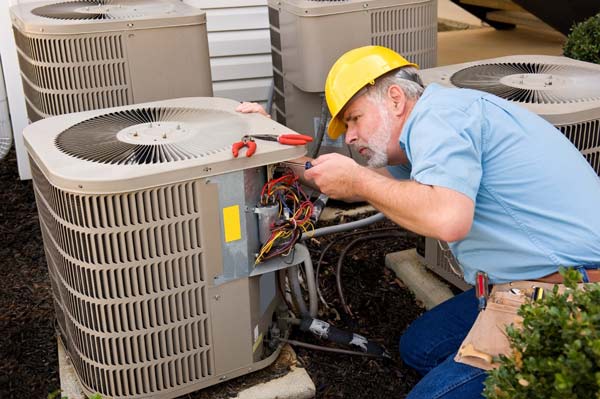
A bad capacitor is a common cause of air conditioning failure. This small, cylindrical device charges the motor and powers the AC unit to cool your home. If your AC system is functioning abnormally and you suspect the capacitor is at fault, knowing the signs to watch out for can help.
1. The AC Unit Doesn’t Turn On
Faulty capacitors don’t store enough charge to power the compressor and fan motors, and your AC unit may not start. The capacitor sits in the outside unit, so you should check it if your AC system doesn’t turn on. If your HVAC technician determines the capacitor has malfunctioned, a simple replacement should get your air conditioner running again.
2. Blowing Warm Air
If your AC unit turns on but blows warm air, the capacitor may be to blame. A failing capacitor cannot keep up with a cooling system that constantly runs when it’s hot. You can turn the unit off and on again to see if the issue goes away, but have an HVAC professional check the capacitor and blower motor if your home stays warm.
3. Problems With Turning On and Off
A capacitor in good condition kickstarts the cooling process, and your AC system turns on effortlessly. When a capacitor is on its last legs, it can’t power the motor with the necessary startup torque, and your AC unit may take too long to work after you turn it on. You may even hear the AC unit attempting to start but struggling to get past the starting line.
In other cases, the air conditioner might turn on as usual but turn off unexpectedly. This problem occurs because the capacitor cannot supply a consistent charge to your motors during the entire cooling cycle. Random air conditioner shutoffs are frustrating when it’s hot because your home doesn’t get cool enough to be comfortable. So have a cooling expert check if you need a capacitor replacement.
4. Burning Smell or Smoke
A bad capacitor forces the motor to work harder than usual, leading to overheating and a burning smell. However, you may fail to notice the electrical odor because the capacitor sits outside. If your air conditioner isn’t working, look at the condenser unit to ensure the motor isn’t overheating.
A fire hazard can sometimes occur since the capacitor holds plenty of electrical charge, even when it malfunctions. If you see smoke, immediately turn off the AC system and have a cooling technician look at the unit.
5. Humming Noise
A humming noise from the condenser unit may indicate that the motor lacks enough torque from the capacitor to start. A struggling motor makes considerable noise you can hear when near the unit. But, humming noises can arise from other failing internal components. An HVAC contractor must check the entire cooling system to determine the cause of the unusual noises.
6. Soaring Energy Bills
If your energy bills suddenly soar without a change in your family’s lifestyle, your AC system is working harder to cool your home. When the capacitor malfunctions, the condenser fan motor uses more energy because it needs to work harder to make you comfortable.
If the capacitor struggles to hold energy, it constantly generates more to store, leading to high energy bills. When replacing the capacitor, an HVAC technician also checks for other causes of high energy consumption, like clogged air filters and low refrigerant levels.
7. Swollen Capacitor
If you suspect your capacitor is faulty, you can check the device for visible bulges. A capacitor is sleek and cylindrical, with wires connected at the top. Turn off the power before you open the condenser unit’s cover panel to check the device.
Capacitors contain dielectric fluid to discourage overheating, but the fluid expands in a bad capacitor causing the device to swell. Such a capacitor cannot be repaired, and your AC unit will need a new one.
A capacitor may be a small device, but it causes large problems when malfunctioning. Contact us at Steele Brothers Heating, Inc., today to solve any cooling issue.
